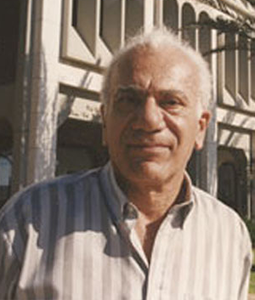heading
1998: Gedeon Dagan, Israel
It was for his outstanding research on groundwater that Professor Gedeon Dagan of Tel Aviv University was awarded the 1998 Stockholm Water Prize. He seems to have a sixth sense for the dark, invisible aquifers below.

Beneath him, inside the hill, lies a huge aquifer, stretching further to the east and right under the West Bank. Groundwater stores are no respecters of political boundaries, but they are essential resources to all the people who have their homes on top of them, whichever country or political system they happen to live in. Research to investigate the characteristics of this water is therefore of the utmost importance.
“Groundwater is incredibly valuable all over the world, but especially in dry regions like the Middle East and northern Africa .Close international cooperation is essential if these limited and vital natural resources are to be wisely managed. ”
“The problem is that you can only make measurements and observations at individual points, which have to be fairly widely scattered,” he explains. “Another problem is that the rocks and sediments which contain groundwater are so heterogeneous.”
Over the last twenty years Dagan has developed mathematical models – referred to as ‘stochastic models’ – to describe how groundwater moves through porous materials and transports pollutants and other substances. ‘Stochastic’ means that the aim of these models is to account for uncertainty and to improve decision making under risk. They are based on probability in a way that brings them as close as possible to reality. “Changes below the ground surface take a long time, and that means there’s also a long delay effect when it comes to halting pollution,” Dagan explains.
“A functioning model enables us to see approaching problems at an earlier stage. With good predictions, we will perhaps be in a position to stop or reduce the spread of pollution. This kind of advance warning is useful, since any proposals for action are subject to another kind of delay, resulting from the fact that the decisions have to be taken by politicians. Forecasts can relate to likely movements of chemicals, metals or radionuclides, for example. Sweden may have a potential problem stored up for the future in its nuclear power programme. The waste is held in rocks in the ground, and from there radioactive substances could disperse with groundwater.”
Carcinogenic radioactive substances from nuclear explosions can also pose a threat to groundwater. Near Las Vegas in Nevada, it has recently been established that plutonium from atom bomb tests in the 1970s has been carried several kilometres from the test site by groundwater. In the case of Russia, it is feared that the scale of such problems could be immense.
Dagan emigrated to Israel from Romania as a young engineer, back in 1962. After twelve years at the Israel Institute of Technology in Haifa, he became a professor, before moving to the engineering faculty of Tel Aviv University two years later, in 1976. Professor Gedeon Dagan collaborates with researchers and universities all over the world. In a distinguished career that has spanned more than 40 years, he has served ten visiting professorships. His travels have taken him to such distinguished institutions of higher learning as the University of California at Berkeley; Imperial College, London; Ecole des Mines, Paris; and Princeton University.
Lately, Professor Dagan achievements have been recognised by the Institute for Scientific Information, which has included his name among the highly cited researchers in the fields of Environment and Engineering. Professor Dagan was awarded the 2005 Horton Medal of the American Geophysical Union.